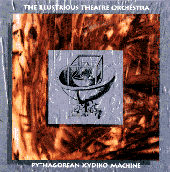
Pythagorean Xydiko Machine (1995)
Shane W. Cadman: tenor saxophone, keyboardChristine Dietrich: violoncello
Paul Greenhaw: keyboard
John P. Hoover: baritone saxophone
Scott McIntosh: clarinet

1. Pythagorean Xydiko Machine 3:19 (Paul Greenhaw)
2. Love Answers Under Rain's Allure 8:44 (Shane W. Cadman)
3. The Shade Never Was 3:22 (Shane W. Cadman)
4. Ex Periculum 4:41 (John P. Hoover)
5. All Night I Heard the Birds Flying 12:51 (Shane W. Cadman)
Two Dance Movements:(Paul Greenhaw)
6. Cool Shoes 3:07
7. Still Life 3:41
8. Song Without Words 4:07 (John P. Hoover)
9. Dancing in Bedlam 7:51 (Shane W. Cadman)
Love Answers Under Rain's Allure, The Shade Never Was, All Night I Heard the Birds Flying, and Dancing in Bedlam © 1994 Illustrious Music (ASCAP)
Pythagorean Xydiko Machine and Two Dance Movements (Cool Shoes and Still Life) © 1994 Tetraprosopokyklon Publishing Co. (BMI)
Ex Periculum © 1994 and Song Without Words © 1993 Festina Lente Music Publisher (ASCAP)
My music on this CD was not commissioned by anybody and was written for The ITO for no other reason than I love to write and I love to play.
My pieces on this recording were written during a two-year period. "The Shade Never Was" and "All Night I Heard the Birds Flying" were written in 1992. "Dancing in Bedlam" and "Love Answers Under Rain's Allure" were written during 1993. Only during playback of this CD did I realize that three of these four pieces feature a primary instrument. "The Shade Never Was," which features the piano in a rare solo appearance, was inspired by both Handel and a section in the last movement of "All Night I Heard the Birds Flying." "All Night I Heard the Birds Flying" is a clarinet concerto (written for Scott McIntosh) with the standard three-movement form, although it is somewhat shorter than most concertos, and the three movements are connected. The title of this work comes from one of Christopher Columbus' diaries, but I read it in a novel by Gabriel Garcia Marquez. Although the title of this piece evokes certain images, and the piece may sound like it is connected to the title, the music was not meant to be programmatic in any way. "Love Answers Under Rain's Allure" features the tenor saxophone, with cello solo for some contrast. All I will say about this piece is that sometimes the answer is right in front of you. "Dancing in Bedlam" is the only piece of mine on this CD which does not feature any specific instrument, but it does utilize different color and texture changes between the various instruments. I wrote this piece to have some fun, both as a composer and as a performer. However, in feeling the need to provide some contrast and add a little "weight" to the piece, a slow middle section was created which is one of the more spiritually rewarding bits of music that I have written.
My music on this CD was not commissioned by anybody and was written for The ITO for no other reason than I love to write and I love to play.
"Pythagorean Xydiko Machine" is not programmatic in nature. In other words, it does not concern itself with socio/political topics (i.e. environmental concerns, AIDS, female circumcision, animal rights, poverty and homelessness, racial violence, manipulation of the information super-highway, etc....) nor does it appropriate any other musical systems (i.e. Klezmer music, Eskimo chant, dijeridou drones, South American marimba melodies, jazz riffs, Aztec flute tunings, Icelandic dance rhythms, etc....). The "Two Dance Movements," ("Cool Shoes" and "Still Life") on the other hand, are programmatic in nature.
My music on this CD was not commissioned by anybody and was written for The ITO for no other reason than I love to write and I love to play.
Although my two compositions on this CD are outwardly similar, they are products of different compositional processes. The words ex periculum are Latin for "out of peril." The phrase also implies learning through experience, a type of knowledge gained by trial and error. Aptly named, the piece "Ex Periculum" started as simple keyboard figuration, developed into a piece for five instruments, and underwent a major structural revision before settling into its present form. "Song Without Words" is a musical poem that sprung into existence in one inspired day, and has not been altered since conception. If only every day could be so fortuitous!
Special thanks to APG, Michael Blachly, Bill Davila, Chris Douridas, Scott Duncan, Bonnie Grice, John Henson,
Thom Hill, The Most Reverend Richard Kern, Jonathon Marcus, Debra Nelson, David Palmer, Tracy
Seretean, Andy Summers, John Vestman and Trent Wilson.
